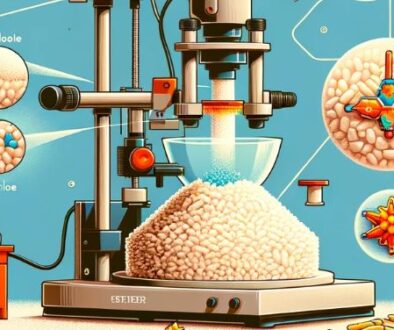Determination Of Bioavailability Of Lead In Rice Based On In Vitro Simulated Digestion/Caco-2 Cell Model
Exploring lead’s bioavailability in rice using an in vitro digestion/Caco-2 cell model, highlighting risks and differences between rice varieties.
In order to examine the potential health risks of lead-contaminated rice to the human body, an in vitro simulated digestion/Caco-2 cell model was established to determine the bioavailability of lead in rice. The results show that in simulating the gastrointestinal digestion process of lead in rice, the bioavailability of lead in uncooked rice and cooked rice is 61.34% ~ 70.59% and 39.69% ~ 47.48% in the gastric digestion stage, and 24.39% ~ 24.39% in the intestinal digestion stage. 41.79% and 13.57% to 15.13%. The bioavailability of lead in indica rice after gastrointestinal digestion is higher than that in japonica rice. The bioavailability of uncooked rice through gastric and intestinal digestion is higher than that of cooked rice. A mature Caco-2 cell model was established and used to measure the bioavailability of lead in rice. Tetraethyl lead and inorganic lead were used to spike the rice. The bioavailability of uncooked rice was 3.32% and 7.0%, and the bioavailability of cooked rice was 3.32% and 7.0%, respectively. Effectiveness is 2.65% and 5.7%. In vitro simulated digestion/Caco-2 cell model is an effective means to evaluate the bioavailability of lead in rice
Introduction to Lead Contamination in Rice
In the realm of food safety and public health, understanding the potential hazards associated with the consumption of contaminated foodstuffs is paramount. One such concern is the presence of lead in rice, a staple food for a large portion of the global population. Recent research endeavors have aimed to shed light on the bioavailability of lead in rice, utilizing an in vitro simulated digestion/Caco-2 cell model. This innovative approach not only advances our understanding of how lead interacts with the human body but also underscores the nuanced complexities of dietary lead exposure.
Study Methodology and Lead Bioavailability Findings
The study in question meticulously simulated the gastrointestinal digestion process to evaluate the bioavailability of lead in both uncooked and cooked rice. Bioavailability, in this context, refers to the proportion of lead that becomes available for absorption into the bloodstream after ingestion. The findings reveal that the bioavailability of lead during the gastric digestion stage ranges from 61.34% to 70.59% in uncooked rice and from 39.69% to 47.48% in cooked rice. During the intestinal digestion stage, these figures diminish to 24.39% to 41.79% for uncooked rice and 13.57% to 15.13% for cooked rice. Notably, indica rice demonstrated a higher bioavailability of lead post-gastrointestinal digestion than japonica rice, indicating varietal differences in lead absorption potential.
Caco-2 Cell Model Utilization and Results
To further assess the bioavailability of lead, the study established a mature Caco-2 cell model. This model is instrumental in evaluating how lead is absorbed by the human intestinal epithelium, a critical step in determining its potential impact on human health. The research utilized tetraethyl lead and inorganic lead to spike the rice samples. It was found that the bioavailability of lead in uncooked rice was 3.32% for tetraethyl lead and 7.0% for inorganic lead, whereas for cooked rice, the figures stood at 2.65% and 5.7%, respectively. These results highlight the variances in lead bioavailability between different forms of lead and rice preparation methods.
The study’s utilization of the in vitro simulated digestion/Caco-2 cell model represents a significant stride towards understanding the mechanisms of lead absorption from rice. It underscores the importance of considering both the form of rice consumption and the type of rice when assessing lead exposure risks. The findings suggest that cooking rice may reduce the bioavailability of lead, potentially mitigating some of the health risks associated with its consumption. However, the higher bioavailability observed in indica rice varieties warrants further investigation to understand the factors contributing to these differences.
Significance and Implications of Research Findings
This research provides crucial insights into the potential health risks posed by lead-contaminated rice, emphasizing the need for continuous monitoring and regulation of heavy metals in food products. It also underscores the utility of advanced in vitro models in evaluating the bioavailability of contaminants, offering a promising avenue for future food safety research. As we advance in our understanding of dietary exposure to heavy metals, such studies are indispensable in informing public health policies and consumer practices to safeguard health and well-being.
For futher details of this article and research, feel free to contact our team for assistance.
Original research was done by Xia Xia, Kong Lingyan, Fang Yong, Li Hongmei, Yang Peiling, Hu Qiuhui, Pei Fei, Chen Yue
About ETprotein:
ETprotein, a reputable plant protein vegan protein Chinese factory manufacturer and supplier, is renowned for producing, stocking, exporting, and delivering the highest quality organic bulk vegan protein and plant proteins. They include Organic rice protein, clear rice protein, pea protein, clear pea protein, oat protein, watermelon seed protein, pumpkin seed protein, sunflower seed protein, mung bean protein, peanut protein, various of plant peptides etc. Their offerings, characterized by a neutral taste, non-GMO, allergen-free attributes, cater to a diverse range of industries. They serve nutraceutical, pharmaceutical, cosmeceutical, veterinary, as well as food and beverage finished product distributors, traders, and manufacturers across Europe, USA, Canada, Australia, Thailand, Japan, Korea, Brazil, and Chile, among others.
ETprotein specialization includes exporting and delivering tailor-made protein powder and finished nutritional supplements. Their extensive product range covers sectors like Food and Beverage, Sports Nutrition, Weight Management, Dietary Supplements, Health and Wellness Products, and Infant Formula, ensuring comprehensive solutions to meet all your protein needs.
As a trusted company by leading global food and beverage brands and Fortune 500 companies, ETprotein reinforces China’s reputation in the global arena. For more information or to get a free sample of their protein products, please contact them and email sales(at)ETprotein.com today.












